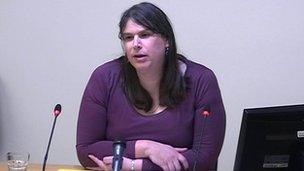Leveson Inquiry: Guido Fawkes 'forced lawyers to chase'
- Published
Paul Staines, author of Guido Fawkes blog: "I would upload to free hosting services after the close of business hours."
The man behind political website Guido Fawkes has told how he avoided legal action by using foreign web hosts.
Paul Staines said he published a Merrill Lynch memo about the potential £50bn cost of bailing out Northern Rock bank despite legal attempts to stop it because people "had a right to know".
Lawyers had to "chase" the story in different jurisdictions, he said.
Irish citizen Mr Staines told the Leveson Inquiry into media ethics he was not bound by UK judges' orders.
"What I think you're missing is that I'm a citizen of a free republic and, since 1922, I don't have to pay attention to what a British judge orders me to do."
Director of Public Prosecutions Keir Starmer, Huffington Post UK editor Carla Buzasi, Martin Moore of the Media Standards Trust, Will Moy of Full Fact, Helen Belcher, of Transmedia Watch, and Pam Surphlis, of Support After Murder and Manslaughter in Northern Ireland (SAMM NI) have also been giving evidence to the inquiry
'Spurious threats'
Mr Staines said by publishing information in several countries during the Northern Rock crisis he forced lawyers Carter Ruck to "chase it" in several jurisdictions.
He used hosting sites in countries where normal business hours were closed, meaning the lawyers had to wait until morning before taking the matter up with the sites' owners.
"It's impossible for them to do anything," he added.
Mr Staines said Guido Fawkes, which has a daily readership of 50,000-100,000, was now hosted by a small US hosting service, partly in order to stop UK authorities from getting at him.
He said: "I don't want the site to disappear because someone has made what I would view as a spurious threat."
Asked why he was not prepared to join any regulatory body, Mr Staines said two journalists had told him hacking and blagging had been "personally authorised" by Sunday Mirror editor Tina Weaver, who sits on the PCC and ethics committee, the editorial standards committee.
"She knows all the bad things that have gone on under her rule. It's ridiculous," he said.
Ms Weaver has previously told the inquiry she was not aware of phone hacking at her newspaper but there was no guarantee that it had not occurred.
Mr Staines, who has a background as a think tank member, professional gambler, rave party organiser, hedge-fund manager and investment adviser, also said political journalists often used his website to launch attacks on rivals.

Helen Belcher says nothing happens when transgender people complain to the PCC
"Quite often they'll stick the knife in to each other by me and won't have their fingerprints on the story."
He said journalists still working in the industry would be reluctant to write openly about other journalists or address the inquiry for fear it would harm their careers.
He described the interaction between his blog and the more traditional media, saying Sunday newspapers sometimes asked him to keep a story going so that they could "go big" on it on Sunday.
'Five-a-side team'
Illustrating the difficulties in preventing publication of details banned by injunctions, Mr Staines told how in 2011 he posted a fictional five-a-side football team on Twitter, naming Ryan Giggs as one of the players - the footballer was at that time covered by an injunction banning him from being identified as the player who allegedly had had an affair with celebrity Imogen Thomas.
Several lawyers threatened action against him but it came to nothing, he said.
He had also been issued with injunctions in three jurisdictions on behalf of politician Zac Goldsmith and his sister, Jemima Khan but said the pair received a judicial rebuke from an Irish High Court judge over the case.
"This was before she [Ms Khan] became a freedom of information campaigner," he added.
Another example of the blog challenging the law came when it "set out a riddle" to identify former RBS chief Fred Goodwin, who had taken out an injunction that banned his name being linked to allegations of an affair.
Mr Starmer told the inquiry there had been "only a handful of cases" where his office has considered bringing charges against journalists.
He said a policy was needed that "set out in one place the factors that prosecutors will take into account when considering whether to prosecute journalists acting in the course of their newsgathering".
'Immense distress'
He promised an interim policy to make things clearer, followed by consultation.
Ms Belcher, whose organisation monitors the media portrayal of transgender people, said people had been forced to move house after receiving threats after newspaper articles were published about them.
She gave the example of a Sun story, headlined "Dad-of-two driver changes gear in sex swap", which caused the subject of the story and her children "immense distress" as it was written as though she had colluded with it, when she had not even been contacted by the paper.
"She had nothing to do with the story. It is pure expose. It has nothing to do with the public interest."
But she said transgender people did not tend to complain about newspaper articles, because nothing ever changed despite the Press Complaints Commission receiving a number of complaints.
Meanwhile, it has emerged Heather Mills is to give evidence at the Leveson Inquiry into press standards.
The ex-wife of Sir Paul McCartney is expected to answer questions relating to evidence from former News of the World editor Piers Morgan.
Daily Mail editor Paul Dacre, who appeared on Monday, will also return to the inquiry on Thursday.
- Published7 February 2012